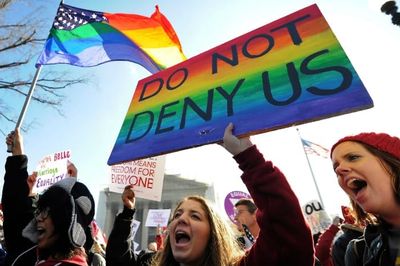In a move anticipated by many prognosticators, the Sixth Circuit Court of Appeals has essentially chosen to defer its decision regarding marriage equality to the Supreme Court. The three judge panel was divided 2-1.
Of particular note to Tennesseans is the scathing dissent from Tennessee-based Justice Martha Craig Daughtrey. Of the three judges on the panel, Daughtrey was viewed as the most liberal, with Deborah Cook the most conservative and Jeffrey Sutton the right-leaning swing vote. In her dissent, Justice Daughtrey lambasted her colleagues for abdicating the role they were charged to perform.
“Today, my colleagues seem to have fallen prey to the misguided notion that the intent of the framers of the United States Constitution can be effectuated only by cleaving to the legislative will and ignoring and demonizing an independent judiciary,” she wrote. “The framers crafted Article III to ensure that rights, liberties, and duties need not be held hostage by popular whims.” She continued:
If we in the judiciary do not have the authority, and indeed the responsibility, to right fundamental wrongs left excused by a majority of the electorate, our whole intricate, constitutional system of checks and balances, as well as the oaths to which we swore, prove to be nothing but shams.
The decision from the majority, Justices Cook and Sutton, did not discuss whether marriage equality would ever arrive in Tennessee, Kentucky, Ohio, and Michigan. In fact, the judges make clear in their ruling that it is inevitable. Yet they pre-empt their ruling regarding the cases before it by framing the question before them as one of judicial versus legislative authority:
When the courts do not let the people resolve new social issues like this one, they perpetuate the idea that the heroes in these change events are judges and lawyers. Better in this instance, we think, to allow change through the customary political processes, in which the people, gay and straight alike, become the heroes of their own stories by meeting each other not as adversaries in a court system but as fellow citizens seeking to resolve a new social issue in a fair-minded way.
Abby Rubenfeld, the civil rights attorney working on the Tennessee case, is like most Tennesseans this week: dealing with the multiple blows of a disappointing mid-term election, state constitutional amendments and their aftermath, as well as the Tennessee State Supreme Court rejection of the appeal to hear the case on the state law that bans non-discrimination ordinances. Add to it a family member in poor health, and she commented on today’s news first by saying, “It’s been like the worst week ever,” and then offered these thoughts:
This decision is deeply disappointing and inconsistent with the fifty other federal court rulings since Windsor [the Supreme Court ruling that invalidated DOMA] and it is unfair to all the thousands of LGBT Tennesseans who are already married to same-sex spouses whom they love and treat as anyone else treats their spouse.
By denying marriage equality in these four states, the Sixth Circuit has split from the appeals courts that have struck down marriage bans in other parts of the country. Earlier this year, Supreme Court Justice Ruth Bader Ginsburg hinted that point to be one where the Supreme Court would find itself compelled to review marriage equality.
In her dissent, Justice Daughtrey suggests that, while that may have been the intention of her colleagues, she is compelled to dissent nonetheless. She wrote:
one is tempted to speculate that the majority has purposefully taken the contrary opinion [from the other appeals courts] to create the circuit split regarding the legality of same-sex marriage that could prompt a grant of centiorari by the Supreme Court and an end to the uncertainty of status and the interstate chaos that the current discrepancy in state laws threatens.
According to the Human Rights Campaign, the plaintiffs have the choice now to request an appeal before all members of the Sixth Circuit or appeal directly to the Supreme Court.
Rubenfeld added, “Hopefully the Supreme Court will correct this error and injustice by taking our cases and making clear that the United States Constitution protects all of us, including LGBT Americans. Marriage is a fundamental right, for all couples, not just opposite sex ones.”
Transgender activist Marisa Richmond: "I appreciate Judge Daugherty's thoughtful and passionate dissent. This issue now moves to the Supreme Court. I hope that they will enforce the Constitution of the United States and put an end to the separate rights that Tennessee has enacted."
Chris Sanders, Executive Director at the Tennessee Equality Project, spoke on behalf of his organization: “We are disappointed, but we remain hopeful that we will get justice in the Supreme Court. Rallies around the state are coming tomorrow.”
Read the entire ruling here.
graphic via reasonableactions.com
